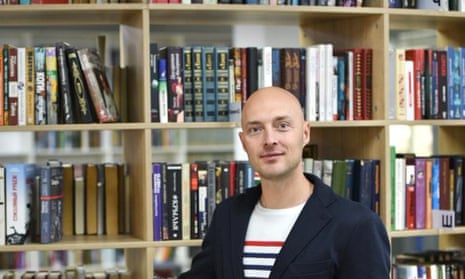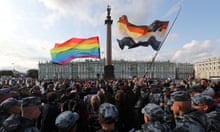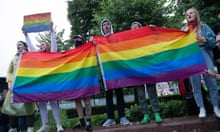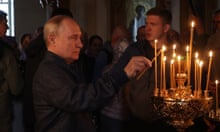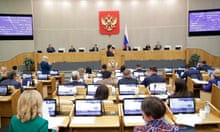As a gay man growing up in Russia, books were Vladimir Kosarevsky’s refuge, offering him a precious glimpse into lives that in some way echoed his own. So when the Moscow librarian received orders late last year to destroy books referencing same-sex relationships – part of a sweeping attack on gay and transgender rights – Kosarevsky knew it was a line he wouldn’t cross.
“I realised that if I did it, I would never ever be able to forgive myself,” Kosarevsky told the Guardian from northern Spain, where he is claiming asylum. “It had always been important to me to see those heroes in books, because it represents you somehow. It makes you visible, even when the politics in Russia are determined to erase you.”
Kosarevsky, who at the time was the manager of Moscow’s Anna Akhmatova library, decided to ignore the orders. Instead, he began hiding books, loading them into boxes that he tucked away at the library.
Others, such as a signed copy of My White, a tale of two lesbians raising a child by the Russian author Xenia Burzhskaya, he stashed in the library safe. When pushed for proof that the books had been destroyed, he handed over falsified documents.
He went one step further, leaking the list of the more than 50 books he had been told to purge – from authors such as Haruki Murakami, Danielle Steel and Jean Genet – to independent media.
To hear the 39-year-old tell it, it was a rebellion that had been long in the making. As an openly gay man living in Moscow, he had constantly grappled with discrimination. But the situation spiralled after Russia invaded Ukraine and the country’s politicians seized on the promotion of “traditional values”, pushing through anti-LGBTQ+ legislation that cast Kosarevsky and others as scapegoats for the country’s woes. “Basically the masks came off,” he said.
He initially attempted to tune out of the political situation, burying himself in work at the library. After his brother died from cancer last summer, his focus shifted to supporting his sister-in-law and the couple’s five children.
That is, until the instructions to comply with the anti-LGBTQ+ law came trickling down from his superiors. “I had been discriminated against many times. Now I had to be the one who censors things? And destroys books? No, that’s fascism.”
He worried that the law – which rights groups say functionally outlaws any act or public mention of same-sex relationships – was a slippery slope. “They’re banning LGBTIQ literature today. What comes tomorrow – they take away our right to live?”
After media published the list, the spotlight landed on Kosarevsky. Each institution had received a slightly different list, allowing the leak to be traced back to his library, he said. Given his history of LGBTQ+ activism, his superiors swiftly pieced together what happened, he added.
“They started to cast me as a traitor,” said Kosarevsky. “I realised that they were going to send me to war or throw me in prison.”
If he wanted to keep supporting the family of his late brother, he knew he had to leave right away. He slipped out of Russia in early January, eventually making his way to the Spanish region of Galicia.
Soon after, he went on the record with Novaya Gazeta, an independent news outlet covering Russia, outing himself as the source of the leaked list.
after newsletter promotion
Kosarevsky’s willingness to speak out publicly – putting his career on the line – made people pay attention, said Sergey Lebedenko, the writer and journalist who wrote the article.
“The story exploded. Everyone quoted the story and wrote about it,” he said. “Nobody could believe it at first – book banning in the 21st century? What the hell?”
Lebedenko hailed Kosarevsky for helping to draw attention to the escalating level of censorship in a country where many libraries and bookshops had already taken to wrapping plastic around books authored by so-called foreign agents. “It was really brave of him.”
Shortly after the interview was published, Kosarevsky was fired from the library where he had worked for 14 years. His days are now spent navigating the bureaucracy of applying for asylum in Spain while wrestling with the reality of rebuilding his life from scratch. “My whole life collapsed, I lost everything,” he said. “But I feel safe here, I’m getting a lot of support from the local community.”
Months on, he had no regrets about what he had done, arguing that the revelations helped force authorities to backtrack on their plans. “I have to say that I’m proud of myself for sending the list to journalists,” he said. “Because the general population could actually see what was happening.”
Between intensive Spanish lessons and sketching out plans to write a book, he is also exploring the idea of launching an NGO that could serve as a repository for endangered books, such as those that contain LGBTQ+ themes or characters.
The collection would include books from Russia but also span countries far beyond, with the aim of making them as accessible as possible to shine a light on lives that are all too often rendered invisible. “This is not just happening in Russia,” he said. “The hope would be that people would be able to read them and learn something. Learn the truth, maybe.”
